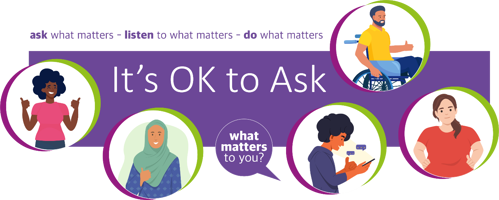Patients & Public
We want you to play an active part in your care and treatment, based on ‘what matters to you’.
It’s important that you understand what’s happening with your health. This means learning about the different treatments and medicines that might help you. When you understand your choices, it’s easier to make good decisions about your care.
Shared decision-making is when you and your doctor, nurse, pharmacist, or healthcare professional work together to decide what’s best for you. They use facts and evidence to guide you, but the final choices are based on what matters to you and your goals.
“It’s OK to Ask” means you, your family, or your carers can ask questions about your medicines. Asking questions helps make sure you get the most out of the medicine.
Medicines are one of the main ways the NHS helps you and others stay healthy and feel better. But sometimes, medicines aren’t used in the safest or most effective way. If medicines aren’t taken or used in the right way, it can make people feel worse instead of better.
Doctors, nurses, pharmacists, and other NHS workers want to help you. They are being asked to listen to you, understand your concerns, and help solve any problems you might have with your medicines.
Think about this: when you or someone you know sees a doctor, nurse, pharmacist or another health worker, do you ever leave with questions about your medicines that you didn’t ask? Or maybe you have concerns, but you don’t feel comfortable talking about them. This happens a lot, and it can make it harder for you to feel confident about using your medicines properly.
You have a really important role in making your medicines work for you. After all, it’s up to you to decide when and how to take them - or even whether to take them at all.
That’s why it’s so important to sort out any issues you have with medicines. When you get the help you need to use your medicines properly, it can make a big difference to your health and help everyone live healthier, happier lives.
Watch this film on
Preparing for your appointment
- Feel free to bring a family member or friend to your appointment. They can ask questions too and help you remember what is said and take notes.
- Write your questions down before the appointment to make sure you ask everything you want to.
- Write notes about your symptoms, medicines or other health issues to take with you.
- Don’t be afraid to tell your healthcare professional if you don’t understand what they’ve said.
- Don’t feel embarrassed about asking your healthcare professional to explain things again.
- Ask your healthcare professional to write down and explain any words you don’t know or understand.
- Remember it is ‘ok to ask’ again if anything is unclear.
- Complete an About me – NHS Nottingham and Nottinghamshire ICB form and take it with you. It is a quick and easy form that is about you, to say what matters to you and what is important to you. It will help you have a better conversation with your healthcare professional. Knowing more about you can help them give you the best advice and care.
By the end of your appointment, we want to be able to answer these questions together:
- What is my main problem?
- What do I need to do?
- Why is it important to do this?
When you are deciding on treatments it is OK to Ask about the:
- Benefits of the treatment
- Risk of the treatment
- Are there any Alternative treatments to try
- And what would happen if you did Nothing and decide against treatment.
Remember it is ‘OK to Ask’ if anything is unclear or you have questions about symptoms, medicines, or other health issues.
Useful information
It's ok to ask - NHS Nottingham and Nottinghamshire ICB
About me – NHS Nottingham and Nottinghamshire ICB
Me-and-My-Meds-Charter-20230628.pdf
Me & My Medicines, Medicines Communication Charter, It's OK to Ask – Home
Get involved
It is important that views of patients, carers, stakeholders, partner organisations and the wider community are represented in decisions about how services are proposed, planned, and delivered, and how they can be improved.
For more information about how you can get involved, please see this link. Get Involved - NHS Nottingham and Nottinghamshire ICB.
.

